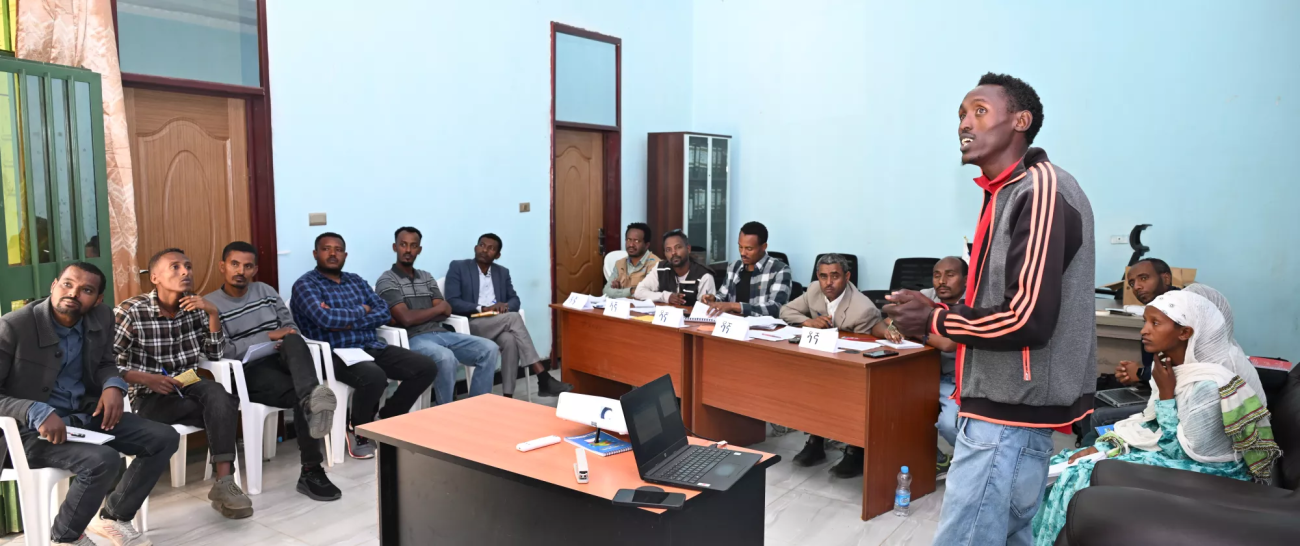ILO awards youth through business plan competition

The ILO's PROSPECTS partnership named 60 winning enterprises by 181 youth from refugee and host communities in Ethiopia's North Gondar to boost economic inclusi
The International Labour Organization (ILO), through the PROSPECTS partnership, announced 60 outstanding enterprises led by 181 young refugee and host community entrepreneurs as winners of its integrated Business Plan Competition (BPC) in the North Gondar Zone of the Amhara Regional State, Ethiopia. After successful completion of 1st BPC in Ethiopia's Somali region, this competition aims to further enhance economic inclusion and improve the livelihoods of refugees and host communities.
Launched in August 2024 in partnership with Digital Opportunity Trust (DOT) Ethiopia and with financial support from the Government of the Netherlands, the competition serves as a platform for aspiring youth entrepreneurs to develop business ideas that can be transformed into sustainable businesses.
“We believe that inclusive labour markets that enable people to participate in self-employment initiatives through entrepreneurship are key to self-reliance, resilience and restoration of dignity—especially for refugees and the communities that host them,” said Stephen Opio, Chief Technical Advisor for the ILO PROSPECTS Programme in Ethiopia and Sudan.
“Through this Business Plan Competition, our aim is not only to provide financial and technical support but to facilitate access to and participation of refugees and host communities in local economic opportunities that support business activity and social cohesion.”
The BPC attracted participation of 2,200 business ideas submitted by 6,100 youth — including 1,153 refugees and 5,038 host community members. Following a rigorous multi-stage selection process involving Business Development Service (BDS) providers and local institutions, 600 promising business ideas were shortlisted. They were provided with technical support on Generate Your Business (GYB) training, an ILO training methodology that supports development of small business concepts.
From this group, 120 business ideas were selected to undergo advanced Start and Improve Your Business (SIYB) training, yet another ILO Business Development Methodology. After which the shortlisted candidates pitched their refined business plans before a jury of experts, comprising representatives from woreda offices (local district government office), financial service providers, BDS providers, Refugees and Returnees Service (RRS) and the private sector. Experts evaluated the business plans based on objective and transparent criteria of viability, innovation, and job creation potential.
Subsequently, the final 60 shortlisted winning ideas received seed funding to implement their business plans. They will continue to benefit from business coaching and mentorship support to ensure long-term sustainability of their small business initiatives. As part of the recently announced Directive of Right to Work, RRS, together with the Amhara Regional Skills and Job Creation Bureau will facilitate the issuance of work permits and business licenses to refugees who are among the 60 winners.
Key areas in which the BPC participants received include:
- Entrepreneurship and business skills development: Participants received training in entrepreneurship, business management, financial literacy, business plan preparation and related technical skills.
- Financial literacy and access: The initiative facilitated connections between participants and financial service providers, promoting trust and access to financial resources.
- Networking and collaboration: The competition fostered collaboration between refugees, host communities, and local institutions, including Business Development Service (BDS) providers, financial service providers, and TVET colleges.
About the PROSPECTS Programme:
PROSPECTS PROSPECTS Programme, an innovative partnership bringing together five agencies i.e.; International Finance Corporation (IFC), ILO, the United Nations Refugee Agency (UNHCR), United Nations Children’s Fund (UNICEF) and the World Bank (WB), is spearheaded and funded by the Government of the Netherlands. The partnership aims to shift the paradigm from a humanitarian to a development approach in responding to forced displacement crises focusing on four pillars: education and learning; economic inclusion; protection and social protection; and critical infrastructure.

